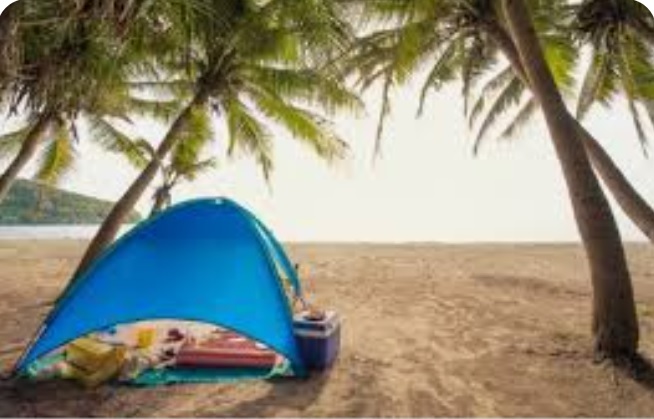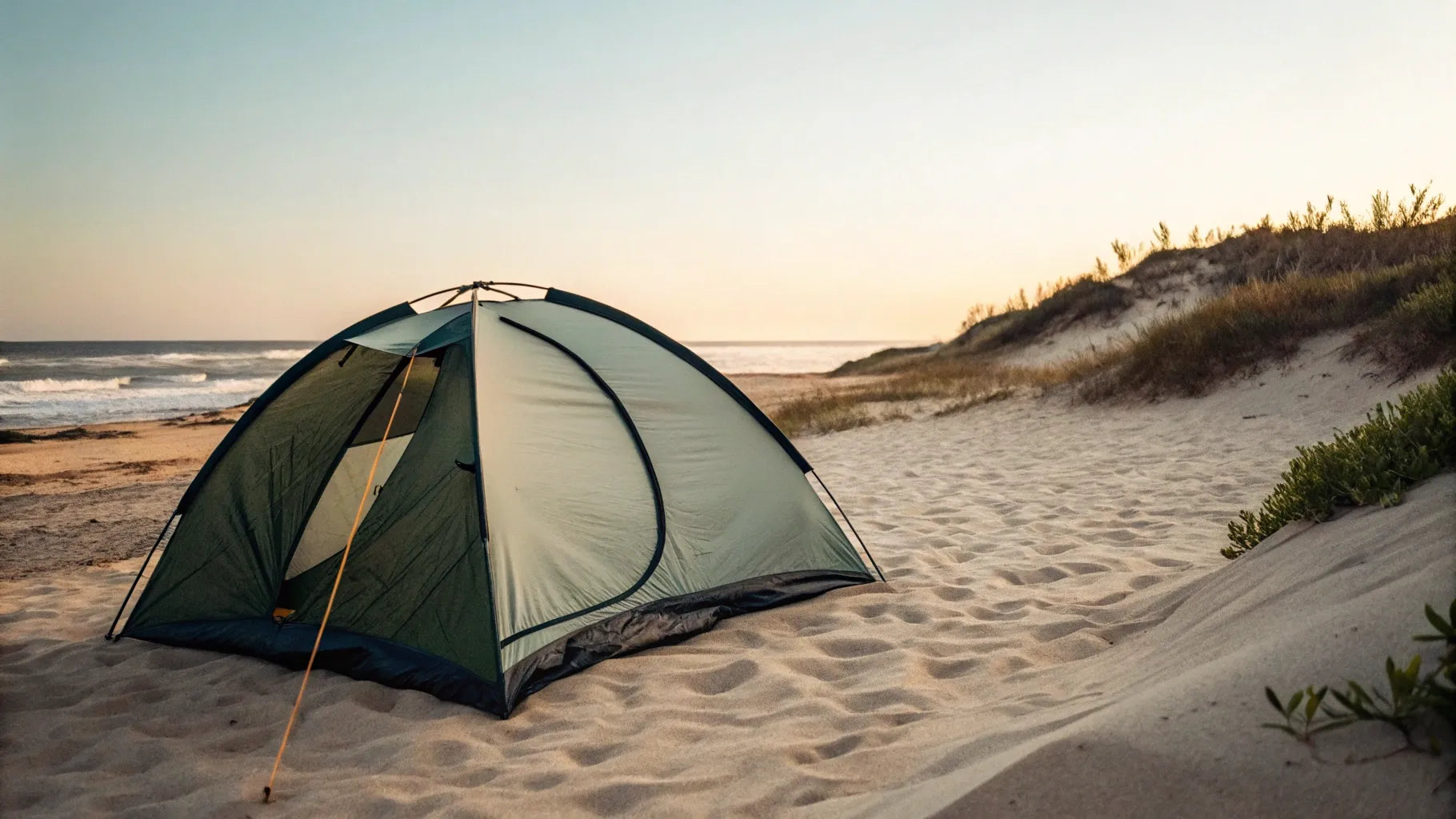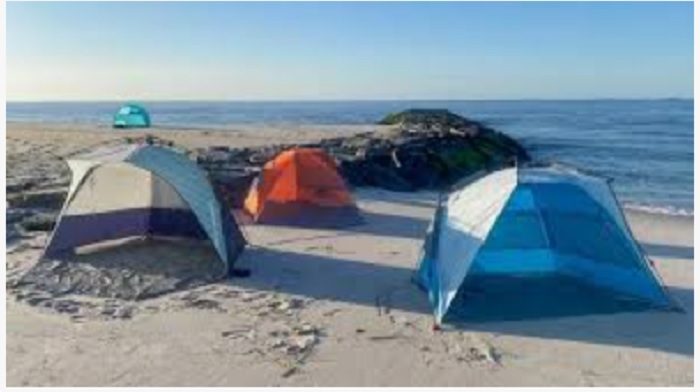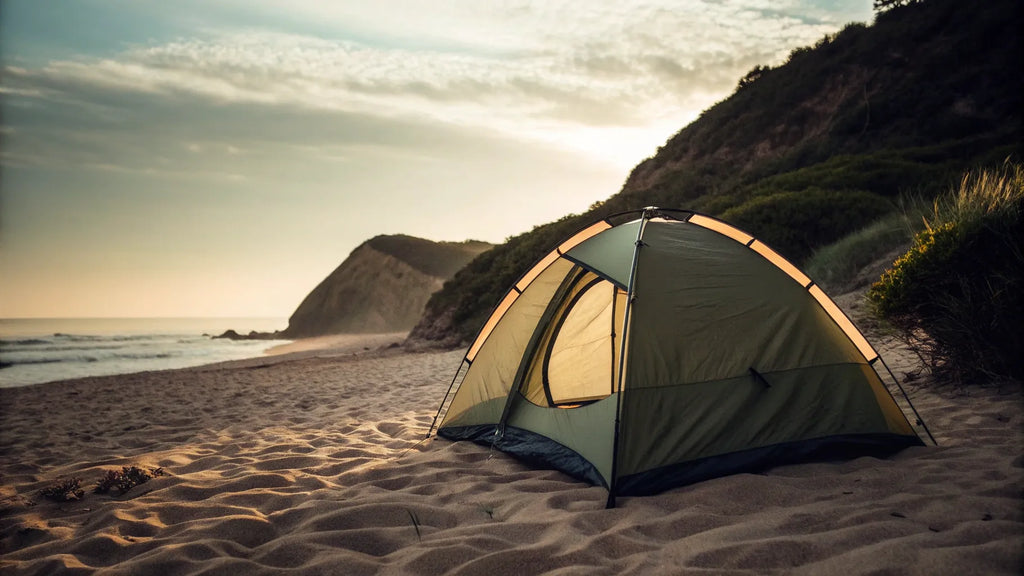Have you ever wondered if you can use a camping tent on the beach? Imagine having your own shady spot right by the waves—a place to relax, change clothes, or escape the midday sun.
But is it really possible to set up a camping tent on sandy shores without it blowing away or filling with sand? If you’ve asked yourself these questions, you’re in the right place. You’ll discover everything you need to know to enjoy your beach day with a camping tent that works perfectly for you.
Keep reading to find out the secrets to a comfortable and hassle-free beach camping experience!

Credit: www.amazon.com
Choosing The Right Tent
Using a camping tent on the beach needs special care. The right tent keeps you safe and comfortable.
Picking the right materials, size, and features helps you enjoy your beach trip more.
Materials Suitable For Beach Use
Beach tents face sand, wind, and salt. Choose materials that resist these well.
Nylon and polyester are good choices. They dry fast and resist water and salt.
- Polyester: strong and water-resistant
- Nylon: lightweight and dries quickly
- Mesh: for ventilation and sand protection
- Aluminum or fiberglass poles resist rust
Size And Ventilation
Pick a tent size that fits your group and gear. Bigger tents need better airflow.
Ventilation stops heat and moisture inside. Look for tents with mesh windows or vents.
- Small tents for solo or couple use
- Medium or large tents for families or groups
- Mesh panels for fresh air flow
- Adjustable vents to control airflow
Uv Protection Features
Sun protection is key on the beach. Some tents block harmful UV rays better than others.
Choose tents with a UV coating or fabric rated for sun protection. This keeps you safe.
- UV-blocking fabric reduces sun damage
- Coatings like UPF 30 or higher are best
- Extended canopies add extra shade
- Light colors reflect sunlight and heat
Setting Up On Sandy Terrain
Camping on the beach can be fun and relaxing. Setting up a tent on sand needs some care. The soft ground can make pitching tricky.
You must use the right tools and choose a good spot. This helps keep your tent stable and safe from wind.
Anchoring Techniques For Loose Sand
Loose sand does not hold regular stakes well. You need special ways to anchor your tent firmly. This stops it from blowing away.
Using sand anchors or burying stakes deep works best. You can also use heavy objects to keep the tent stable.
- Use wide or specialized sand stakes for better hold
- Bury anchors at a 45-degree angle deep in the sand
- Fill bags with sand and tie them to tent corners
- Use driftwood or rocks as extra weight
Best Locations On The Beach
Pick a spot with firm sand to set up your tent. Avoid areas near the waterline to prevent tides from reaching you.
Look for natural windbreaks like dunes or bushes. These spots offer protection from strong sea winds.
- Choose higher ground to stay dry
- Set up behind sand dunes for wind protection
- Avoid soft, loose sand near the shore
- Check for signs of tides and waves
Avoiding Common Setup Mistakes
Many campers make errors that weaken tent stability on sand. Avoid these to keep your tent secure and safe.
Make sure you prepare the area and use the right tools. Double-check your anchors and tent position before settling in.
- Do not use regular stakes only; they slip out easily
- Do not set up too close to water or on soft sand
- Do not forget to secure all tent corners and guy lines
- Do not ignore weather changes or strong winds
Weather Considerations
Using a camping tent on the beach needs careful weather planning. Beach weather can change quickly.
Knowing how to handle wind, sun, and sudden weather helps keep you safe and comfortable.
Handling Wind And Sea Breezes
Beaches often have strong winds and sea breezes. These can make your tent unstable if not secured well.
Use heavy stakes or sand anchors to hold your tent down. Position your tent so the narrow side faces the wind.
- Choose a tent with sturdy poles and good wind resistance
- Use extra guy lines for added stability
- Set up your tent behind natural windbreaks if possible
Dealing With Sun Exposure
The sun on the beach can be very strong. Your tent should protect you from harmful UV rays and heat.
Choose tents with UV-resistant fabric and good ventilation. Use a tarp or canopy for extra shade outside your tent.
- Set up your tent in the shade if possible
- Open vents or windows to improve airflow
- Wear sunscreen and protective clothing inside and outside the tent
Preparing For Sudden Weather Changes
Beach weather can change fast with unexpected rain or storms. Be ready to protect your tent and gear.
Keep rain flies on hand and pack waterproof bags. Check weather updates often during your trip.
- Bring extra stakes and ropes for quick reinforcement
- Store valuables in waterproof containers
- Have an evacuation plan for severe weather

Credit: www.battlbox.com
Maintaining Your Tent By The Sea
Using a camping tent on the beach is fun but needs extra care. Salt, sand, and moisture can harm your tent. Taking good care keeps it safe and lasts longer.
Here are easy tips to keep your tent clean and dry after beach camping.
Cleaning Off Sand And Salt
Sand and salt can damage your tent fabric and zippers. Always remove them after you pack up. Use fresh water to wash away salt and sand particles.
Brush off loose sand before rinsing. Avoid harsh soaps that can ruin waterproof coatings.
- Shake or brush off dry sand outside the tent
- Rinse with fresh water gently
- Use a soft cloth for stubborn salt spots
- Let your tent dry completely before storing
Preventing Mold And Mildew
Mold grows fast in damp tents, especially near the sea. Dry your tent fully before folding it. Open all doors and windows to air it out.
If your tent smells or shows dark spots, clean it with mild soap and water. Avoid bleach as it can harm the fabric.
- Dry the tent in sunlight if possible
- Store tent loosely folded, not tightly packed
- Use a tent-safe cleaner for mold stains
- Keep your storage area dry and cool
Storage Tips After Beach Use
Store your tent in a dry place after beach trips. Avoid plastic bags that trap moisture. Use a breathable tent bag or a cotton sheet.
Check your tent for damage before storing. Fix small tears and broken zippers to prevent bigger problems later.
- Clean and dry tent completely
- Fold loosely to keep fabric fresh
- Store in a cool, dry place
- Repair damages before storing
Additional Gear For Beach Camping
Camping on the beach is fun but needs special gear. The sand and sun create unique challenges.
Using the right tools makes your beach camping safer and more comfortable.
Sun Shades And Tarps
Sun shades and tarps protect you from strong sunlight. They create cool spots to relax.
You can set them up over your tent or seating area. They block UV rays and reduce heat.
- Choose lightweight, waterproof materials
- Look for easy-to-set-up designs
- Use poles or nearby trees to support shades
Sand Stakes And Weights
Normal tent stakes don’t hold well in soft sand. Sand stakes are longer and wider.
Weights like bags filled with sand help keep your tent stable. They stop it from blowing away.
- Use sand-specific stakes for firm anchoring
- Bring sandbags or heavy objects as weights
- Check your tent often to adjust stakes or weights
Comfort Accessories
Comfort items make your beach camping more pleasant. They help you relax after activities.
Items like beach chairs, mats, and coolers add convenience. They keep you comfortable on hot sand.
- Bring a foldable chair for sitting
- Use a thick mat or blanket to lie on
- Keep drinks cool with an insulated cooler

Credit: tpwmagazine.com
Safety And Environmental Tips
Using a camping tent on the beach can be fun and relaxing. It is important to stay safe and protect nature while camping.
Follow simple rules to keep yourself safe and help the environment stay clean and healthy.
Respecting Wildlife And Beach Rules
Be aware of animals living near the beach. Do not disturb or feed them. Many beaches have rules to protect wildlife.
Check local beach rules before setting up your tent. Some areas may have restrictions on where you can camp or what you can bring.
- Keep a safe distance from animals
- Do not leave food scraps outside
- Follow posted signs and rules
- Use designated camping spots if available
Fire Safety On The Beach
Fires on the beach can be dangerous if not controlled. Always check if fires are allowed before lighting one.
Keep your fire small and away from tents, dry plants, and trash. Never leave it unattended and fully put it out before you leave.
- Use fire pits or grills if provided
- Keep water or sand nearby to put out fire
- Do not burn plastics or other harmful materials
- Watch the wind direction to avoid sparks
Leaving No Trace
Keep the beach clean by taking all your trash with you. Leaving no trace helps protect the environment and wildlife.
Pack out everything you bring in. Avoid damaging plants or digging large holes near your tent.
- Take all garbage and leftover food
- Do not break branches or plants
- Use biodegradable soap if washing is needed
- Leave natural objects where you found them
Frequently Asked Questions
Can A Camping Tent Withstand Beach Conditions?
Yes, a camping tent can withstand beach conditions if it’s properly anchored. Opt for tents with UV-resistant materials to handle sun exposure. Use sand stakes or bags to secure the tent against wind. Regular maintenance and cleaning will prolong its lifespan.
What Type Of Tent Is Best For The Beach?
A pop-up tent is ideal for the beach. It’s easy to set up and offers UV protection. Look for water-resistant materials and good ventilation to ensure comfort. Lightweight designs are easier to carry across sandy areas.
How Do You Anchor A Tent In Sand?
To anchor a tent in sand, use sand stakes or sandbags. Fill bags with sand and attach them to the tent corners. Alternatively, bury stakes deeply at a 45-degree angle. Ensure the tent is taut to resist wind.
Are Beach Tents Different From Camping Tents?
Yes, beach tents are often smaller and designed for shade. They usually have UV protection and better ventilation. Camping tents are more robust and weather-resistant, suitable for various terrains. Choose based on your needs and environment.
Conclusion
A camping tent can work well on the beach with the right care. Choose a tent designed for sandy and windy places. Secure it firmly to avoid blowing away. Bring extra stakes or weights for stability. Remember, sun and salt can wear out your tent faster.
Clean and dry it after your trip. Enjoy the shade and shelter it provides. A tent can make your beach day more comfortable and fun. Just prepare well, and you will have a great experience.

